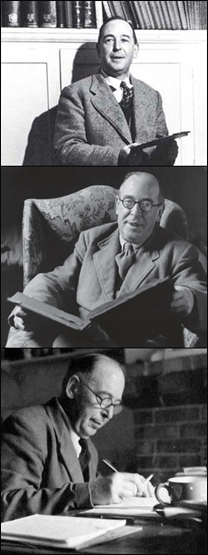
Jack the Blogger
April 6th, 2015 | Skip to comments
Our continued affection for and the extended appeal of C. S. Lewis more than 52 years after his death, now half past the second decade of the supposedly post-postmodern 21st Century, suggests to me two things about him and his work that may seem patently obvious.
Except for the fact that so few people have remarked upon these two things often enough even to call them obvious. To do so would be rather gauche. So count me as one who fearlessly risks overstatement (or understatement for that matter) in commenting on the loyalties of Jack’s expanding readership.
Timelessness Versus Mere Relevance
The first thing to be said is that Jack’s works—all genres and all manner of subject matter—continue with great aplomb to exude their astonishing impact upon present day readers, certainly in orders of magnitude much greater than he witnessed or could have imagined even in his own lifetime. And they sell really well, too! And this is the case even though we are frequently told that his numerous shortcomings have finally caught up to him, thereby signaling the coming downturn in his popularity.
What shortcomings?
Well, we are led to believe that Jack is fussily anachronistic in themes; his metaphors hopelessly daunting, and dated when they’re not; his supernaturalist faith a stern impediment for the un- or de-churched; his vocabulary well beyond the reach of the unschooled; or, paradoxically, embarrassingly concrete and un-theoretical for the academician.
As it happens, none of these deficits turn out to register as flaws among Jack’s actual readers, though they certainly may be true of his cultured despisers and detractors. (One recalls his statement, “We don’t need the critics to enjoy Chaucer; we need Chaucer to enjoy the critics.” In Jack’s case, there seems to be no need to identify a reason to enjoy them.) Indeed, Jack’s readers, against the odds or not, have managed to prove true the heartiest of his readerly exhortations that primary experience of original authors always trumps any secondary reading activity (“Always better to read Plato than about him.”)
No, the winsomeness and clarity of Jack’s prose continues to penetrate the fog of “modern thought,” and finds its home in the hearts and minds of readers and thinkers looking for something refreshingly different, that dares to be original simply by refusing to be. Jack’s anachronism is not a pose but a principle; since “all things not eternal” are “eternally out of date,” and the surest way to avoid irrelevance is not to be avant garde, ahead of the trends, but not to worry about it one way or another, and to take the calendar and the polls out of the equation right from the start. The questions that arise when confronting the central point of one of Jack’s essays or novels or sermons is never, “Is this old?” but always, “Is it so?”
Of course, the truths he foregrounds are neither old nor new; they’re timeless. For Jack’s words are predicated upon the notion that while our through-a glass-darkly understandings may grow or wane within a particular generation or civilization, human nature—our tendencies and propensities for good or evil, our predicaments and aspirations—are well documented, and transcend the particular eras in which we find ourselves situated. And yet, as Jack knew, humanity as God’s creation is not only always under scrutiny, but also alway s under attack. (This, of course, is the substance of his prophetic 1943 work, The Abolition of Man.)
But there is even more to this stor y
of Jack’s ongoing acclaim and warm reception. And this leads me to
the second thing that could be but is not obvious about Jack’s
achievement. 
Caution: Blogger at Work
Few Christian writers since Jack have, in fact, found a way to accomplish exactly what he did, which is only to marshal all that God gave him in prodigious intellect, sparkling wit, relentless interrogation of reason, and incisive championing of the power of the imagination—and then make the combination acutely accessible and poignant for the common man and woman. And children of all ages.
I mean no irreverence, and certainly no insult, to say that Lewis wrote with what we might call today “a blogger’s personality”: which is to say, with an immediacy and topicality and ultimate audience-centeredness that is at once provocative, bracing, and profound. In his gift for aphorism, his ingenuity in serving up multiple entry points into a subject, his conversance with “viral” trends in society, and the disarming subtlety of his convicting rhetoric, Jack makes a connection with readers that compels vibrant, sober attention and, more often than not, joyful allegiance. He can be dismissed (as B. F. Skinner and Richard Dawkins, among others, have tried), but he cannot be ignored.
There is even a kind of Twitter-like attention to brevity and concision one must denote: Jack’s asides are as memorable as most writers’ main texts. He writes for the ear. He creates images that evoke masterfully what may already have been stirring in one’s heart, or has been hitherto ungathered in the mind. He expresses himself in that unique voice that, once known, is always unmistakably his. He takes challenging concepts (epoch-making and era-breaking) and renders them sensible, approachable, meaningful for audiences across the globe.
Of course, by no means am I suggesting that Lewis would endorse the often exhibitionist technologies of communication suggested by MySpace, Facebook, or WordPress. No writer of his time, perhaps, was less interested in the kind of self-aggrandizing publicity and celebrityhood associated with “normal” self-marketing and ultra-promotion characteristic of our age.
The important thing for him to convey was not that certain ideas were “his” in some ego-driven possessive campaign for attention, but that the ideas he articulated and promoted belonged to everyone for all time, and were in danger of being drowned out “by the microphone of his age.” His defense of the public square included exorcism of the “chronological snobbery” that prevente d earnest seekers from hearing all important News from Home.
Jack believed in what G. K. Chesterton called “the democracy of the dead,” the ability of wise men and women of all time periods to speak to the present. He thus published—as prolific a scholar and imaginative writer as he was in the usual outlets—an amazing number of occasional pieces, “op-eds” as it were, to connect with readers of all stations and platforms. (Many of these are helpfully collected by Walter Hooper in volumes like God in the Dock and Christian Reflections.) These pieces appeared with regularity in the 1940s and 1950s in dozens of newsstand journals and newspapers and church-sponsored publication on an impressive variety of popular topics.
All were grounded in the common sense tradition: Jack speaking plainly and forthrightly out of the deep well of his understanding of the West’s traditions and Christianity’s core. Let the Oxbridge elite pontificate upon matters of extreme contemporaneity; Jack, thank you very much, prefers identifying the eternal in the temporal, and noticing the everlasting in the mere mortal.
It is the rare writer, and certainly the rare Christian writer, who is able to capture in sprightly prose for a diverse, multigenerational and capacious audience the burning essentials of an issue or topic, inviting the reader along for a willing conversational journey that will expose them to greater historical vistas and a vocabulary for expressing the heart’s deepest longings.
And so, in addition to poetry, myth, fantasy, literary history, memoir, sermon, and essay, we may now say, with no ironic winking or nudging, that Jack managed to master one more genre, the art of the blog––long before anyone knew what one was.
This entry, updated here, was originally published on HarperCollins’ C. S. Lewis site.




Comments
No comments yet.
RSS feed for comments on this post.
Sorry, the comment form is closed at this time.